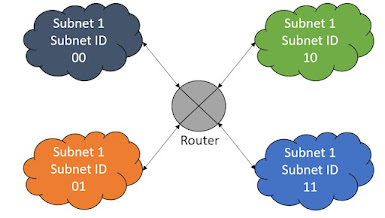ID Usage, Network and Broadcast address, IP range and Host count
For explanation, we get an example of an IP address 192.168.10.32
In an IP address, there are two main parts. one is network id and another one is host id.
Network ID = NID, Host ID = HID
These ID change with IP address classes
Class A
10.11.12.65
The first octet is NID. Last three octet is HID
NID = 8 bit, HID = 24 bit
Class B
129.160.34.62
The first 2 octet is NID. Last 2 octet is HID
NID = 16 bit, HID = 16 bit
Class C
192.168.10.32
The first 3 octet is NID. Last octet is HID
NID = 24 bit, HID = 8 bit
This IP address has a network address and broadcast address
Network address = This address helps to identify the network from other networks. (192.168.10.0)
Broadcast address = This address used to sending a message to all devices in a network or broadcast a message to the network. (192.168.10.255)
Can not use network address and broadcast address for hosts. (for pc)
If we get 192.168.10.32, we know that is a class c IP address. so the last octet is the IP range of this IP.
192.168.10.0 (First IP - network IP)
192.168.10.1
192.168.10.3
|
|
192.168.10.254
192.168.10.255 (Last IP - Broadcast IP)
IP range 0 - 255 ,
All IP count 256 (included with first IP 0)
Then host count 256 -2 = 254 (-2 is network and broadcast IP)



Comments
Post a Comment